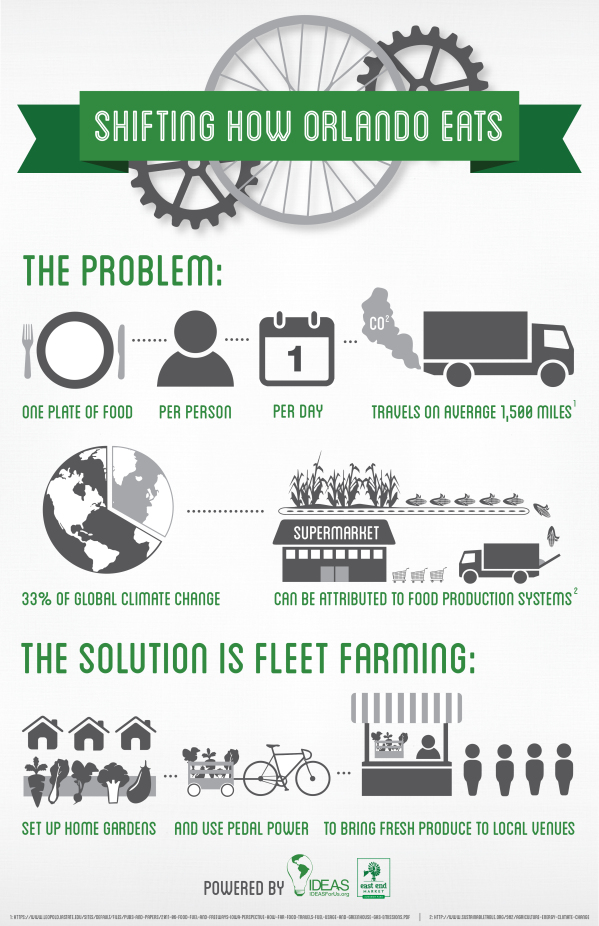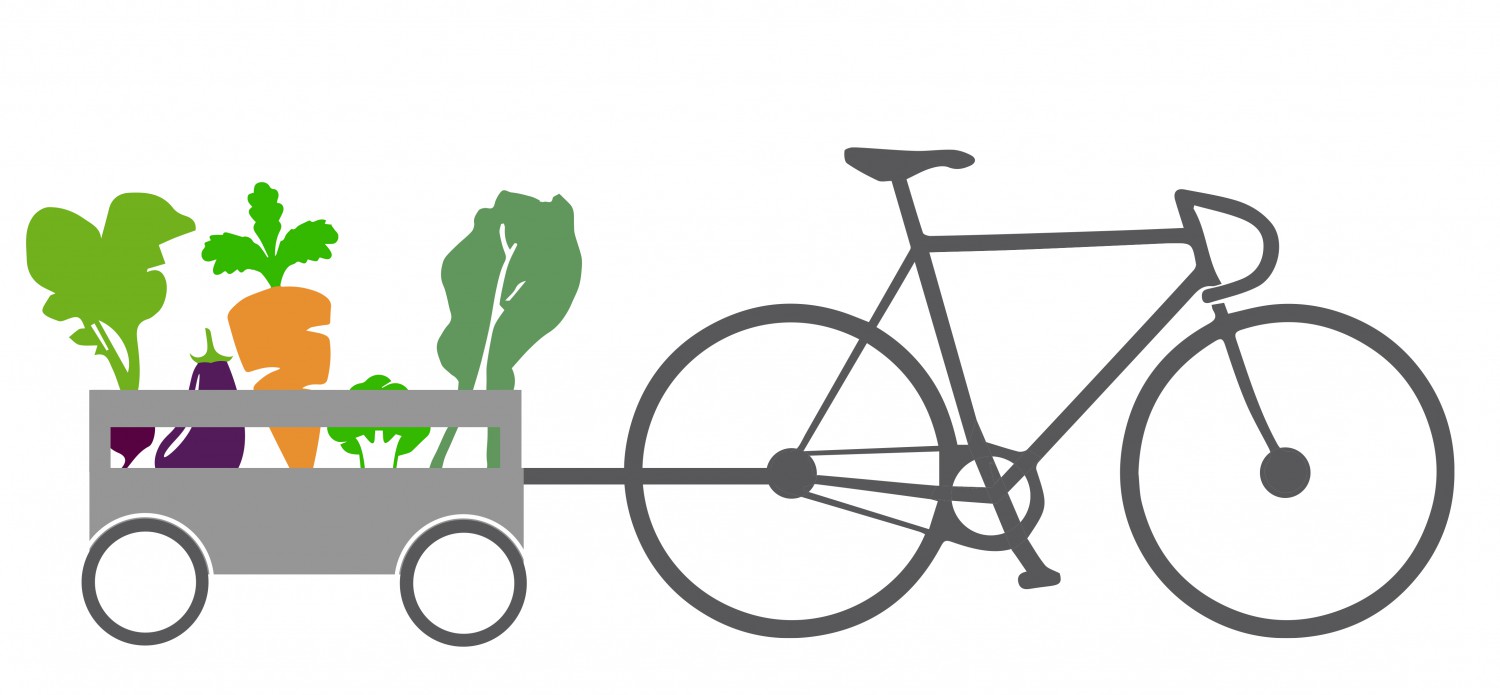A growing farming movement in the United States, centered on bicycles, is proving to be cutting edge in the quest to supply healthy, local food. Bike-riding farmers in Winter Park, Florida, are helping communities produce their own food—right on their private front lawns.
During the first few months of my MBA degree at Rollins College in Florida, I saw that there was a clear synergy between business studies and sustainable development. I decided to enter the ‘Kronstandt Ideas for Good Challenge’ and pitch the idea of small communities in Winter Park utilizing berms (curb sides) and unused public reserves to grow produce. I was awarded second place and this proved to be a small-scale example of how you could successfully combine business with environmental initiatives. From this competition I was mentored by a local Rollins College alumni who facilitates Fleet Farming…an urban farming initiative, implemented in the WinterPark community in 2014, that has already proven successful and profitable.
HERE’S HOW IT WORKS
Fleet Farming is a locally based, community-driven, low-carbon, dispersed urban farming model that uses bike-powered transportation to maintain and harvest produce, which is then sold at local farmer’s markets and local restaurants. The model involves a ‘fleet’ of pedal-powered urban farmers who use bicycles (to keep emissions low) to maintain a series of ‘farmlettes’, tilling the land and harvesting the crops, which are then sold at farmers’ markets in a closed-loop system,limiting input and reducing waste. Home owners who volunteer their lawns may harvest as many vegetables as they require and their ‘farmlettes’ are maintained and weeded by volunteers working for the initiative. ‘Farmlettes’ are small vegetable gardens that have been transformed from inefficient lawns into highly productive vegetable plots to grow produce.
Keeping a lawn, immaculately manicured or otherwise, consumes an enormous amount of energy, resources and money. The average homeowner spends more than 150 hours a year maintaining his/her lawn – according to studies,that’s 35 more than sex!
Furthermore, phosphorus run-off from lawn fertilisers adds to our already polluted waterways, causing algal bloom. This summer at Waipu Cove I was witness to metre deep red algae piled up on the beach. These “unusual” events will continue to occur with increasing regularity unless we address the current pesticide run-off issue.
Due to the current environmental crisis “we are going to have to resume the breeding of plants and animals to fit the region and the farm, incorporating local nature, local carrying capacities, and local needs” (Wendell Berry). The local food movement is one of many initiatives that counters the negative impacts of the current food system, such as the fact that over $600 million worth of food is wasted by New Zealand households each year.

“Through Fleet Farming, local produce is picked when it’s ready, at its optimal timing, has a shorter travel span and is fresher and tastier because of that,” the director of Fleet Farming says. “This adds tons of benefits, including localizing food production into specific neighborhoods, making distribution easier, along with awareness and education to the consumers living nearby each farmlette.”
Nutritional benefits arising from organic food also helps to validate the Fleet Farming model. Research in 2001 found that organic crops had higher average levels of twenty-one nutrients,including vitamin C and iron. Over 50 other studies show that organically grown food and those with lower levels of pesticide contained higher concentrations of vitamins and antioxidants.
“It’s really about serving everybody in a community because people are not eating very good foodthat is shipped in. During the shipping process, much of our food loses nutrient value – a lot of times it is 7 or 8 days from the time it comes off the vine or the stalk before we get it into our bellies. What we are trying to promote is local agriculture, working with farms in the city. When I talk about urban agriculture, I’m also talking about farms that are right on the fringe of the city.” (Agriculturalist, Will Allen)
Fleet Farming is an excellent model that could easily be replicated throughout NZ, and possibly implemented into the school system via an “Edible Schoolyard” program. An interactive education in which students learn how to grow and harvest food has proven beneficial for the development of leadership and learning qualities.
BENEFITS OF THE FLEET FARMING MODEL
- Good for the vendors: According to the American Farm Bureau, farmers usually earn an average of just $0.19 from each retail food dollar. The cost of processing, packaging, distribution, transportation, and retailing consumes the other $0.81.
- Good for the home owner: they consume fresh vegetables at their will and have their vegetable plot maintained.
- Good for main street: local businesses will thrive and restaurants can market their “farm-to-table” produce.
- Good for real estate: attractive for prospective home owners to live in a “Fleet” neighborhood.
- Inexpensive to initiate: Approx. $130 for 250 sq. ft. or $200 for 500 sq. ft.
There is a vast amount of under-utilized land throughout New Zealand that could be used to localise food production. Young New Zealanders should become more engaged in organic farming, allowing kids to develop a better connection with how and where our food is grown. (My parents grow their own produce which has meant I am more engaged and enthusiastic to help prepare meals, knowing I can walk into my backyard and pick produce.) There is also a level of pride and personal happiness that comes from spending time planting and harvesting, not to mention the benefits of sharing produce with family and friends.
The complete guide to starting up a Fleet branch in your community, including resources about the business model, legal forms and waivers, administrative details, growing methods, processing logistics, sales tactics and more can be found here. Movements start off small and as the Dalai Lama said “If you think you’re too small to make a difference…try sleeping with a mosquito in the room.”
Get a group of like minded people and implement Fleet Farming in your neighbourhood!




Leave a comment